Mithais of India is a wonderful treasury of delicious sweet cuisine that is traditionally served at celebrations and festivals.
The land of milk and honey as India was referred to in folklore, with its extensive history and diverse cultural traditions, reflects this richness in a remarkable tapestry of sweets which are an integral part of festivities.
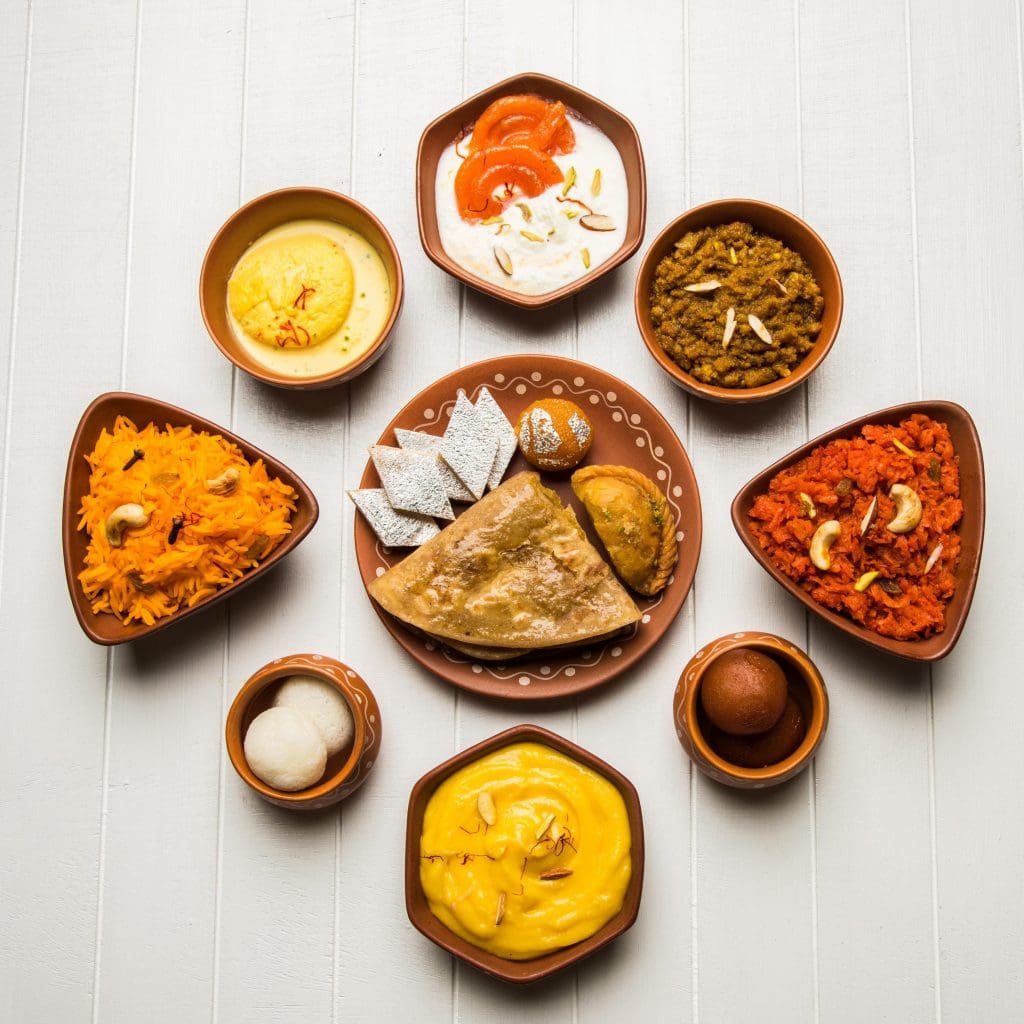
Each and every one of India’s celebrations center heavily on the consumption of food. Not only do people in India show their affection for each other through the consumption of food and sweets, but sweets also make up an essential part of every festival that takes place throughout the country, from north to south, and from east to west.
Each Indian occasion is accompanied by its own unique assortment of sweets, known as mithai, and each region of India prepares a delectable dish that is uniquely theirs for festivities.
The concept of satvik, also known as purity, is deeply ingrained in the religious practices of Indian temples. There is a concept that prasad should first be offered to the Gods, and only after that should it be offered to anybody else. Only pure food is presented as an offering to the gods.
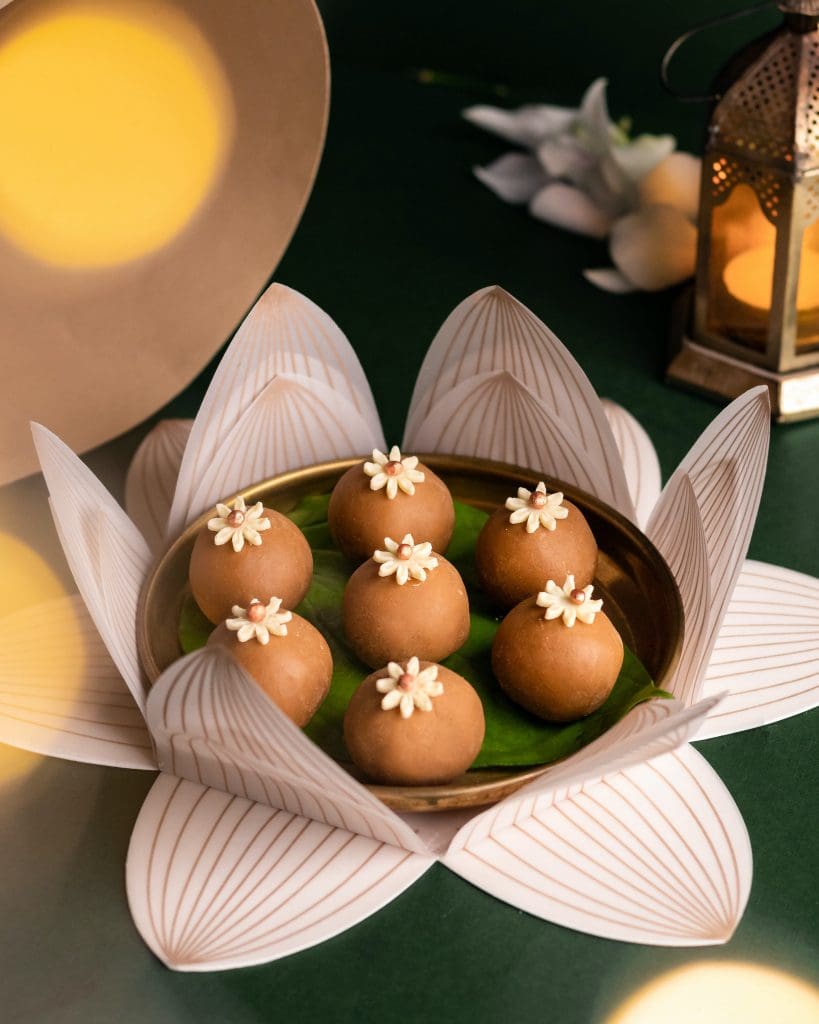
Therefore, Indian mithai types, which typically consist of ghee, sugar, and milk as their principal components (all of which are considered satvik), are often selected. Since ancient times, when people believed that mithai was pristine and offered it to others before consuming it themselves.
Interesting facts about traditional Indian mithai (sweets):
Mithai is an important part of Hindu religious ceremonies and festivals: In Hindu culture, mithai are often offered as prasad (sacred food) to gods and goddesses, and they play a significant role in Hindu religious ceremonies and festivals.
Mithai are used as gifts: Mithai are often given as gifts on special occasions such as weddings, birthdays, and festivals. They are also used to celebrate holidays, such as Diwali, the Festival of Lights, where families exchange sweets and savories with each other.
Mithai has regional variations: Indian sweets vary greatly from region to region, reflecting the diversity of India’s cuisine. For example, in North India, mithai tend to be milk-based, such as barfi and peda, while in South India, sweets are often made with rice or lentils, such as payasam and laddu.
Mithai are made with natural ingredients: Traditional Indian sweets are often made with natural ingredients such as milk, sugar, ghee, and nuts, and are free of artificial flavors and preservatives.
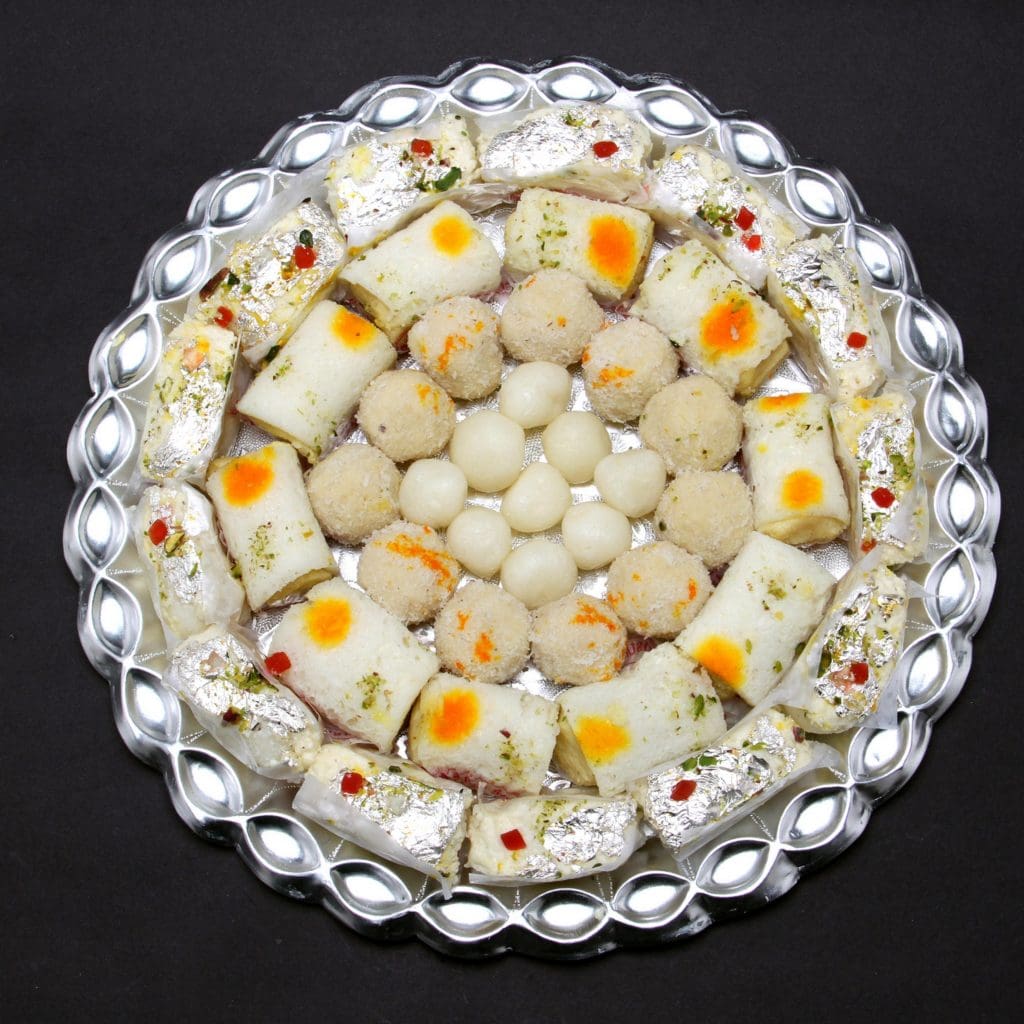
Mithai have therapeutic properties: Many traditional Indian sweets are believed to have therapeutic properties and are used to treat various ailments. For example, ghee-based sweets are believed to be beneficial for the heart, while sweets made with nuts and seeds are said to be good for the brain.
Mithai is an art form: The preparation of mithai is often considered an art form, and many families have passed down their recipes and cooking techniques for generations. Making mithai is a time-honored tradition in India, and it is not uncommon to see entire families working together to prepare large quantities of sweets during festivals and celebrations.
GI tags for Mithais of India
So particular are Indians about their traditional desserts, that controversy on their origins is resolved by regional states applying for GI tags (Geographical Indication) for their mithai (sweet confections). Here are a few types of mithai with name:
- Khaas Darbhanga Laddu: The Khaas Darbhanga Laddu from the city of Darbhanga in Bihar has been awarded a GI tag, making it the first sweet from Bihar to receive this recognition.
- Mysore Pak: Mysore Pak, a popular sweet from the city of Mysore in Karnataka, has also been granted a GI tag. It is a soft, melt-in-the-mouth sweet made from gram flour, ghee, and sugar.
- Petha: Petha, a translucent, soft sweet made from ash gourd, has been given a GI tag for the city of Agra in Uttar Pradesh.
- Sohan Halwa: Sohan Halwa, a famous sweet from the city of Multan in Pakistan, has been given a GI tag for the city of Hyderabad in Telangana.
- Balusahi: Balusahi, a flattened, round sweet made from channa dal, sugar, and ghee, has been awarded a GI tag for the city of Berhampur in Odisha.
These GI tags ensure that only sweets made using traditional methods and ingredients, within the geographical boundaries of these cities, can be called by these names. This helps preserve the cultural heritage and authenticity of these sweets.
Famous regional mithais of India- roots, cooking styles, and significance
India has a rich and diverse regional mithai (sweets) heritage, with each region having its own unique cooking styles, ingredients, and traditions associated with them.
Here are some of the most famous regional mithais of India and their roots, cooking styles, and significance:
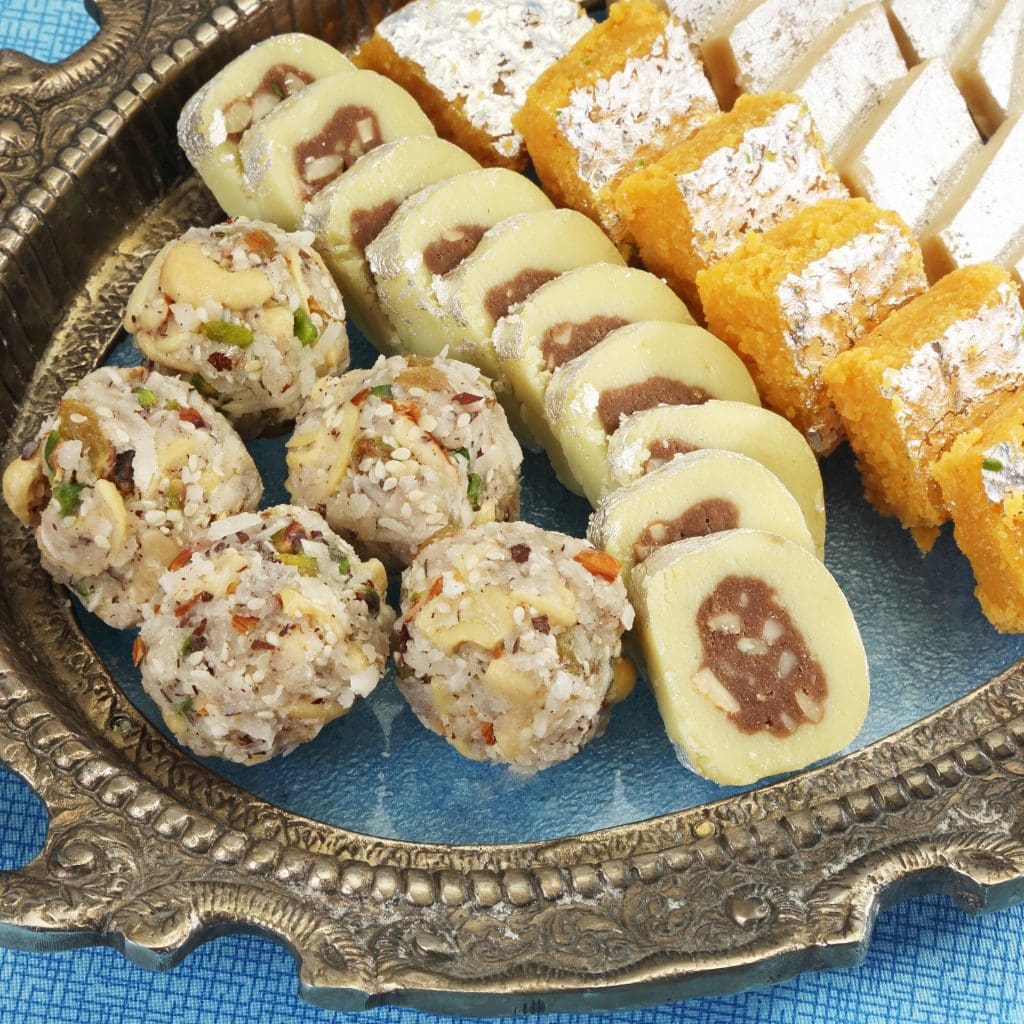
Kolar Bora
Kolar Bora is a deep-fried sweet from the eastern state of Odisha and West Bengal. This is a type of fried sweet made from chana dal, jaggery, and spices. It is made by mixing chana dal (split chickpeas) with sugar and spices, forming the mixture into small balls, and then deep-frying until golden brown. Kolar Bora is often served as a snack or dessert and is a staple at festivals and celebrations in Odisha. It is typically made during the Hindu festival of Durga Puja.
Laddu
Laddu is a sweet made from flour, sugar, and ghee that is shaped into small balls. Laddu is a popular sweet in South India and is often offered as prasad (sacred food) in Hindu temples. Laddu can be made with a variety of ingredients, such as besan (chickpea flour), coconut, or almonds, and it is often flavored with cardamom or saffron. Laddu is a staple at festivals and celebrations in South India and is often given as a gift on special occasions.
There are many different types of laddu found in different regions of the country. Some of the most popular types of laddu include: Besan Laddu made with besan (chickpea flour), sugar, and ghee, is a staple in North Indian cuisine. It is flavored with cardamom and has a dense and chewy texture.
Boondi Laddu is made with boondi, which are small, round balls made from a batter of besan and water. The boondi is fried until crispy and then mixed with sugar syrup and ghee to form the laddu. The famous Motichoor Laddu is a favourite North Indian sweet made with motichoor, which are small, round balls made from besan, mixed with sugar syrup and ghee to form the laddu.
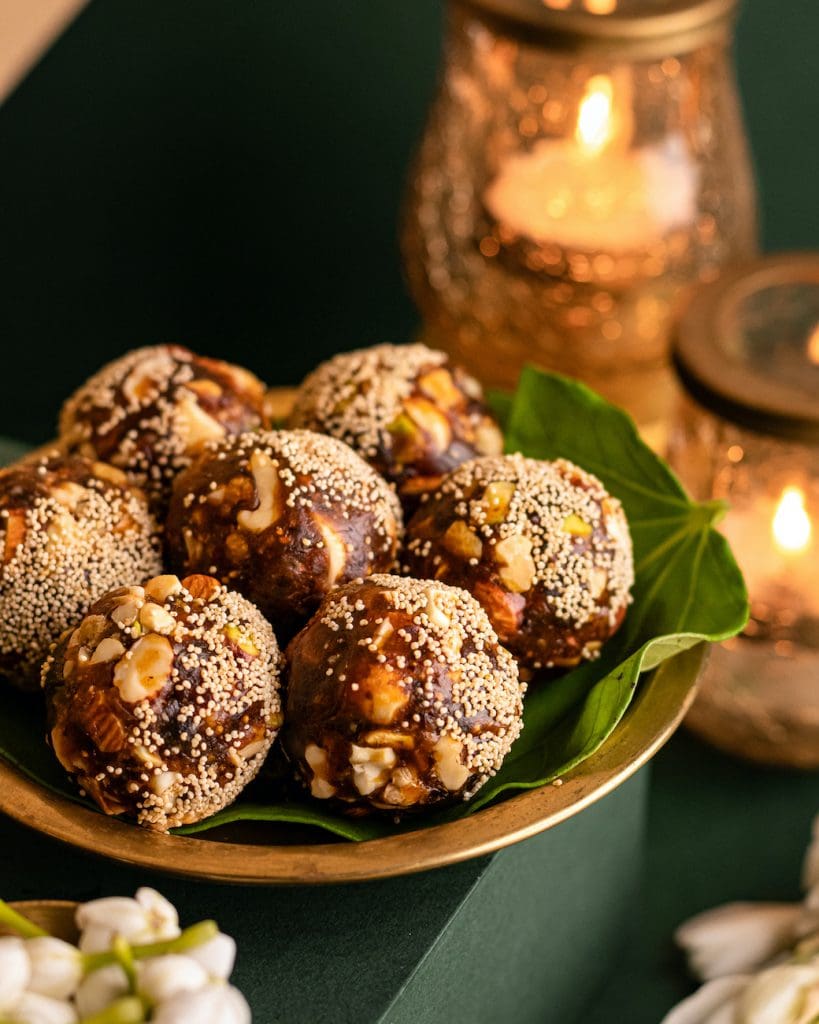
Rava Laddu is loved in South India and is made with rava (semolina), sugar, and ghee. It is flavored with cardamom and has a dense and crumbly texture. In a similar vein, Coconut Laddu is made with fresh grated coconut, sugar, and ghee, and is a popular sweet in South India. It has a creamy and rich texture and is often flavored with cardamom.
With a distinct flavour, Narali Laddu is made with freshly grated coconut, jaggery, and a mixture of spices, and is a popular sweet in Western India, especially in Maharashtra.
Mawa Laddu is a traditional sweet specifically from the northern regions of the country. Mawa is a type of milk solid that is obtained by simmering milk over low heat until most of the water has evaporated, leaving behind a dense and creamy substance. Mawa laddu is made by mixing mawa with sugar, ghee, and other ingredients to form a dough-like mixture. The mixture is then shaped into small round balls, which are then dried and sometimes roasted until they are golden brown.
Mawa laddu has a rich and creamy texture, with a sweet, nutty flavor. It is often flavored with cardamom, saffron, or other spices, and it is typically served as a sweet or dessert dish during festivals and celebrations. Mawa laddu is also sometimes used as a filling for other sweets, such as peda or kulfi.
Kulfi
Kulfi is a traditional Indian ice cream made from reduced milk, sugar, and flavorings such as cardamom and saffron. Kulfi is a popular dessert in North India and is often sold by street vendors in the summer months. Kulfi is denser and creamier in texture than ice cream.
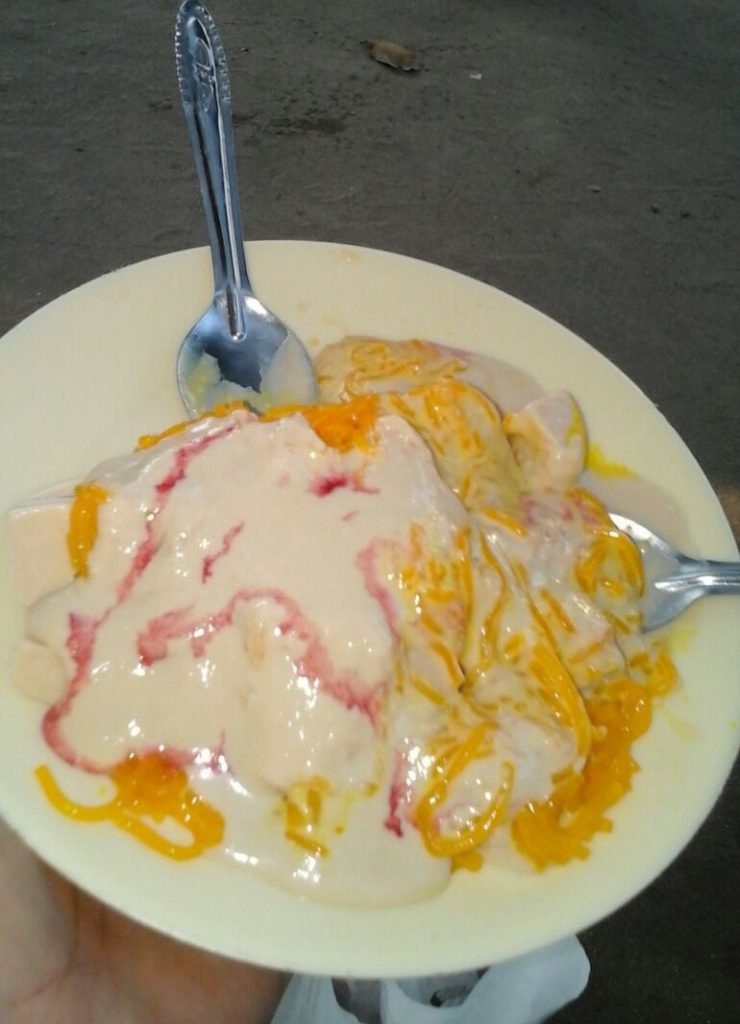
It is prepared with whole milk which is boiled in a heavy-bottomed pan over medium heat until it is reduced. After reduction, sugar, pistachios, almonds, cardamom powder, and saffron strands are added. The mixture is poured into kulfi molds or small cups and frozen for at least 4 hours or until firm and ready to serve. Often a pinch of salt is used to enhance the flavor of the kulfi.
Khaja
Khaja is a flaky, crispy sweet specialty. Many states like Andhra Pradesh, the eastern state of Odisha and Bihar lay claim to being the origin of this delicacy. Andhra Pradesh is said to be applying for a GI tag. It is made by layering a wheat flour dough with ghee and sugar, rolling it out thin, and then deep-frying it until golden brown.
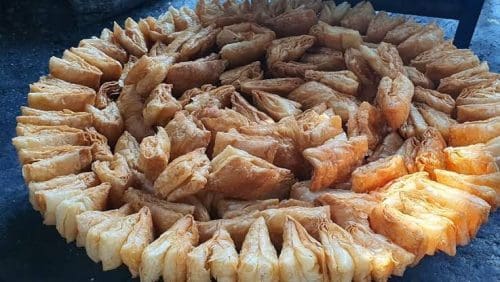
Khaja is famous for its flaky, crispy sweet texture which is a result of layering. Khaja is often served as a snack or dessert and is a staple at festivals and celebrations in India. Khaja is believed to have originated in the temples of Odisha, where it was made as an offering to the gods. According to a legend, In Bihar it is held that Buddha was given Silao Khaja while travelling from Rajgir to Nalanda and went through the township of Silao.
Payasam
Payasam is a sweet pudding is a staple in South India and is made from milk, sugar, and a variety of ingredients such as rice, vermicelli, or semolina.
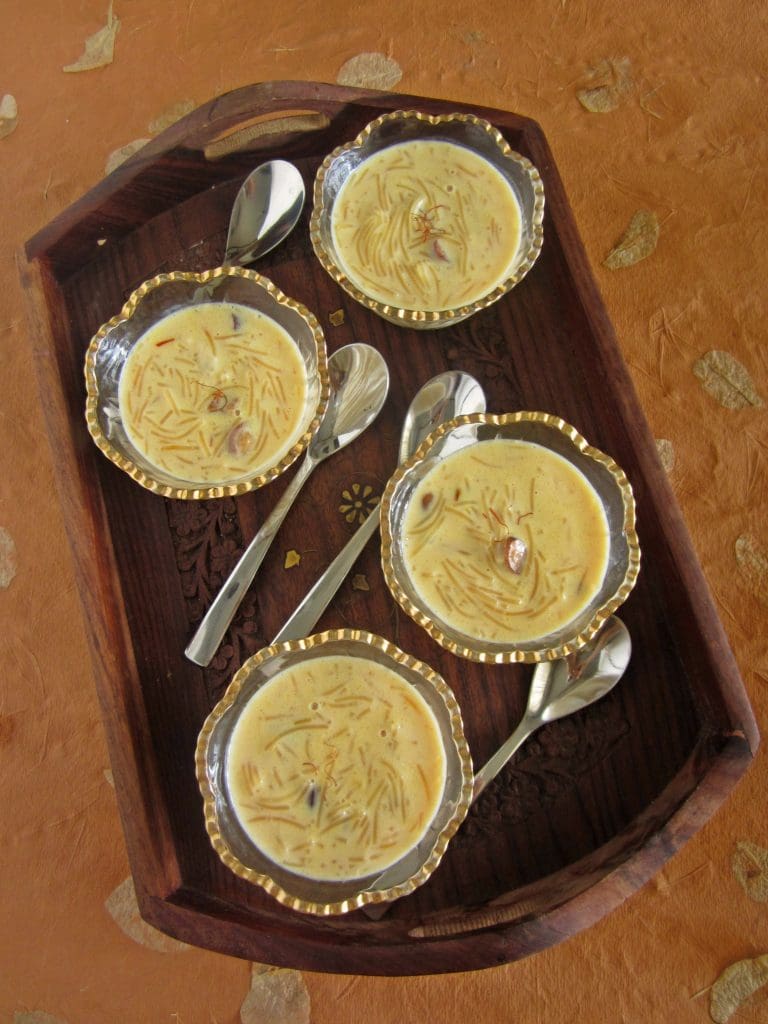
Payasam is often flavored with cardamom, saffron, or nutmeg and is garnished with nuts such as almonds or cashews. Payasam is believed to have originated in the Hindu temples of South India, where it was offered as prasad (sacred food). Today, payasam is an essential part of many South Indian festivals and celebrations.
Barfi
Barfi is a milk-based sweet that is a staple in North India and is made by boiling milk, sugar, and other ingredients such as almonds, cashews, or coconut until it thickens into a dense, fudge-like consistency. Barfi is believed to have originated in the Mughal courts of North India, where it was served as a dessert. Today, barfi is an essential part of many Hindu festivals and celebrations in North India.
Rasgulla
Rasgulla is a deliciously soft, spongy sweet that is a specialty of the eastern state of West Bengal and Odisha and is made by boiling chhena (cottage cheese) balls in syrup. Rasgulla is believed to have originated in the 19th century in the city of Puri in Odisha, where it was made as an offering to the gods. Today, rasgulla is a popular sweet throughout India and is often enjoyed as a dessert or snack. Incidentally, both West Bengal and Odisha have got GI tags for this sweet dish with differentiation in the name.
Mysore Pak
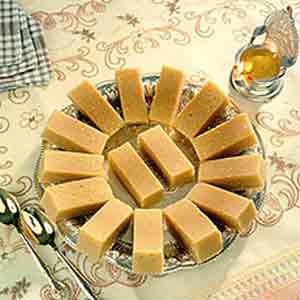
Mysore Pak is prepared in Ghee. It was first practiced in Mysore, which is located in the state of Karnataka in India and is considered to be one of the most important towns there. Kakasurra, a chef working in the kitchen of the Mysore royal court, is credited with being the one who initially created the Mysore Pak. Ghee, sugar, gram flour, and sometimes cardamom are among the ingredients that go into its preparation. This sweet has the consistency of a cookie that’s thick and buttery all at the same time.
Adhisaram
According to the Tamil people, Adhisaram is a dessert of the gods and is presented as prayer sweets at significant festivals such as Diwali. It is also the most delicious sweet food that can be found in the state of Tamil Nadu. Rice flour, jaggery, butter, and pepper are the four ingredients that go into making the traditional dessert that has its roots in ancient Tamil culture.
It is a type of payasam, which is a sweet pudding made from milk, sugar, and other ingredients. Adhisaram is flavored with cardamom, saffron, and other spices. The mixture is simmered on low heat until the rice is fully cooked and the mixture has thickened. Adhisaram can be made in various forms and styles, with variations in ingredients, cooking techniques, and presentation. Some common variations of adhisaram include chakkara adhisaram, made with jaggery instead of sugar, and kesari adhisaram, made with semolina instead of rice. Each variation has its own unique flavor and texture, reflecting the diverse and rich cultural heritage of South Indian cuisine.
Adhisaram is traditionally served as a dessert or sweet dish in South Indian households, especially during festivals and celebrations. It is a rich and flavorful dessert that is enjoyed by people of all ages and is considered to be an essential part of South Indian cuisine.
Gulab Jamun
Gulab Jamuns, an Indian festival specialty, are part of every Indian celebration. This sweet, round doughnut-like dessert is made from a mixture of milk solids, flour, and sugar syrup. Gulab Jamun is made by simmering milk solids or khoya till the water evaporates. The leftovers are moulded into soft dough and deep-fried. Small balls are steeped in saffron or cardamom-flavored sugar syrup. Gulab Jamuns are popular in India due to their smooth texture, and delicate crust.
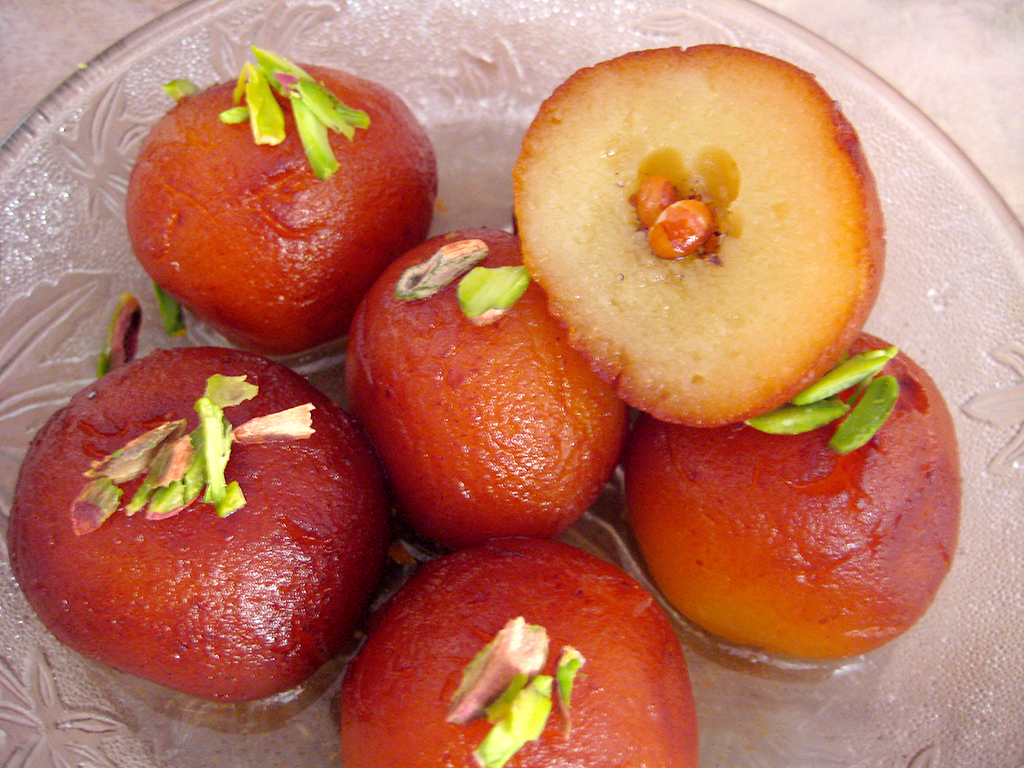
It is believed to have originated in the kitchens of the Mughal emperors of North India, where it was made as a special treat for royalty. Today, gulab jamun is a popular sweet throughout India and is often served at weddings and other special occasions.
Jalebi
Jalebi, or imarti, as it is known across India, is a sweet that is enjoyed by millions of people every evening with a cup of hot tea and is considered to be a dessert among the street cuisines of India. To prepare it, a batter consisting of maida flour is first deep-fried into the form of a pretzel or a circle, and then it is soaked in sugar syrup.
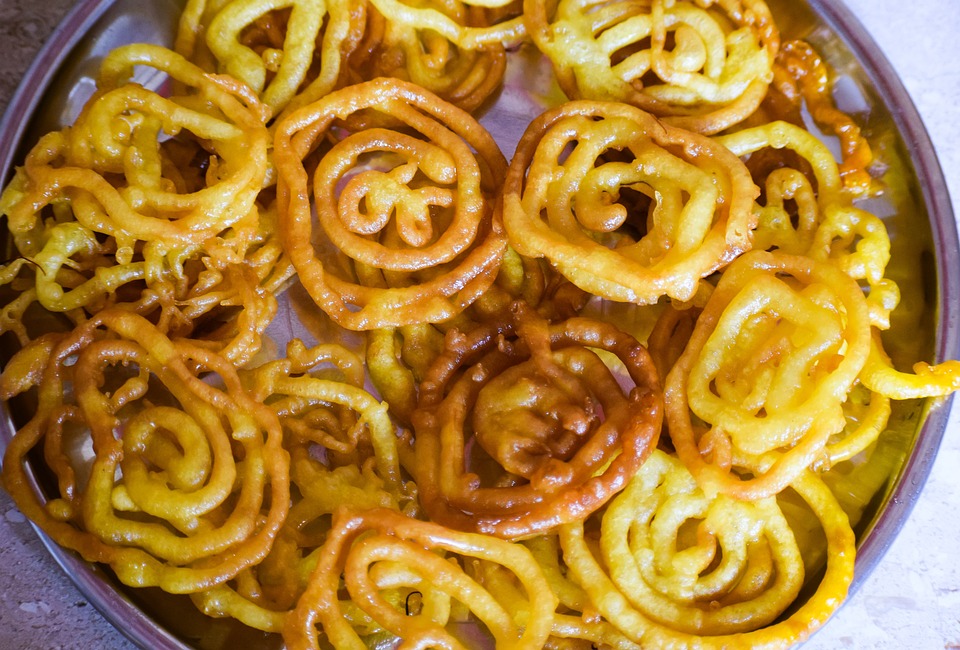
Jalebi is a popular sweet in North India and is often served with rabri (sweetened condensed milk) or kulfi. The traditional way to consume jalebi is with curd or rabri, and sometimes other flavours like kewra are also added.
Sandesh
Both the people of Bengal and their food place a strong emphasis on sweetness. Shondesh, also known as Sandesh, is characterized by a harmonious combination of sugar and chhena that causes it to dissolve easily on the tongue. The term “Sandesh” comes from the Persian word for a message.
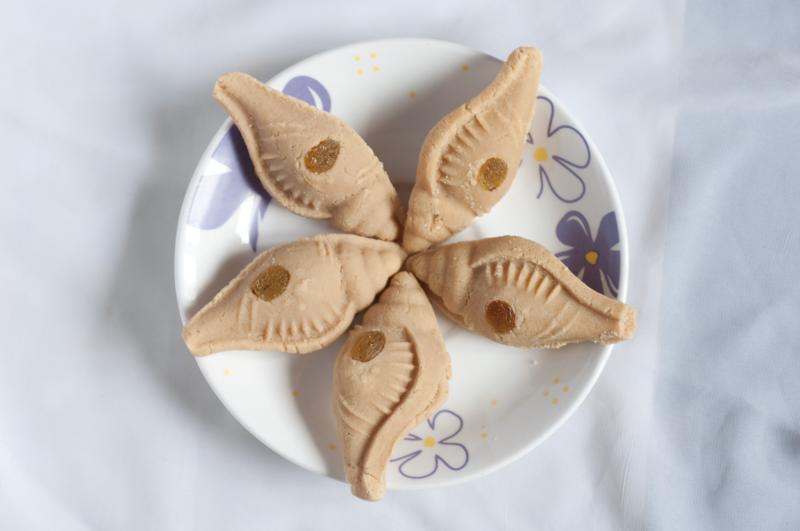
The sweet treat was presented to the recipient in the spirit of “Shubh Sandesh,” which literally translates to “good news.” Sandesh, a delicious and very delicate sweet that will please your emotions as nothing else can, can only be found in Kolkata, which is why it is the finest spot to enjoy it.
Petha
It’s true that the city of Agra is famous for its Mughal architecture, but travelers with a sweet tooth would likely agree that their vacation in Agra isn’t quite complete until they’ve indulged in some of the city’s scrumptious Petha, which can be found practically everywhere in the city. Ash gourd is one of the primary components that is used in the preparation of petha.
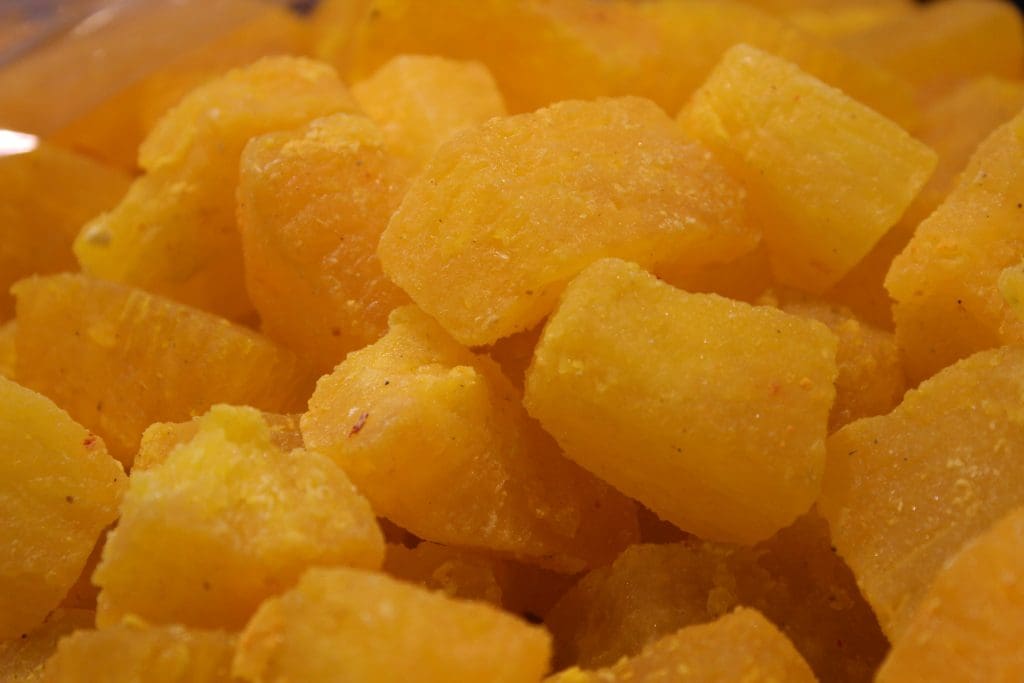
Long ago, while Shah Jahan was still the ruler of Agra, he sent orders to his cooks to create a one-of-a-kind dessert that would be as pristine and white as the Taj Mahal. After a lot of effort, the royal cooks came up with a brand-new creation that they named Petha. Since it just contains fruit, sugar, and water, many people believe that it is the most natural sweet treat that can be found anywhere on the globe.
Modak
The sweet dumpling known as modak may be cooked in either a frying pan or a steamer. It is made consisting of freshly grated coconut and jaggery, while the soft shell is made out of rice flour, wheat flour blended with khava or maida flour, or a combination of the three.
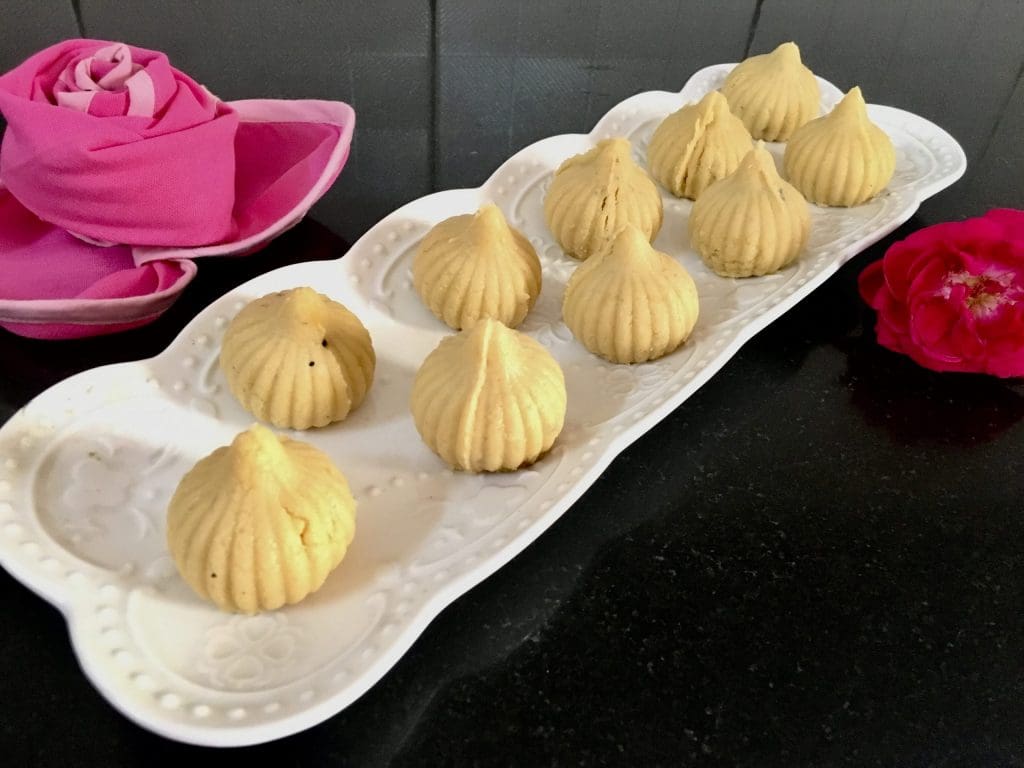
The variant that is prepared by steaming is known as ukdiche modak, and it is consumed while still hot with ghee. This traditional Indian delicacy is most well-known for being the dessert that the Hindu god Ganesha enjoys eating the most. As a result, it is always prepared as a religious offering during the Ganesh Chaturthi festival, which takes place once a year to honor and celebrate the god Ganesha.
Rajbhog
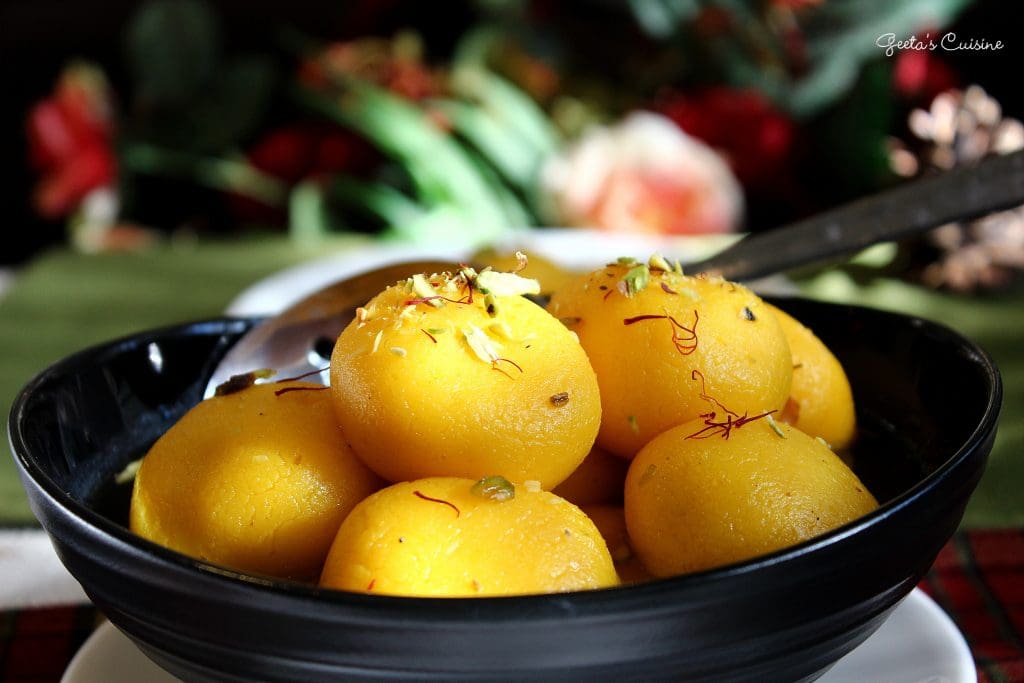
A classic Indian sweet dish, Rajbhog of Bihar is made from Indian cottage cheese and is stuffed with a variety of nuts, including almonds and pistachios, as well as green cardamom powder, saffron, and occasionally mawa. The dish is named after the state of Bihar in India. Rajbhog, which comes from the state of Bihar, is a treat that can only be found in its purest form and with the most authentic taste in that state.
Gajar Ka Halwa
Gajar ka halwa is another highly popular Indian dessert dish, particularly in the northern and central regions of India. It is a very visually appealing way to consume carrots. It is a joy to consume and has its roots in the Indian subcontinent; it is often prepared during the colder months of the year. It is composed of carrots, milk, sugar, and almonds, and it is cooked over a low flame until the milk evaporates, resulting in a deliciously sweet dish that is meant to be had after a meal.
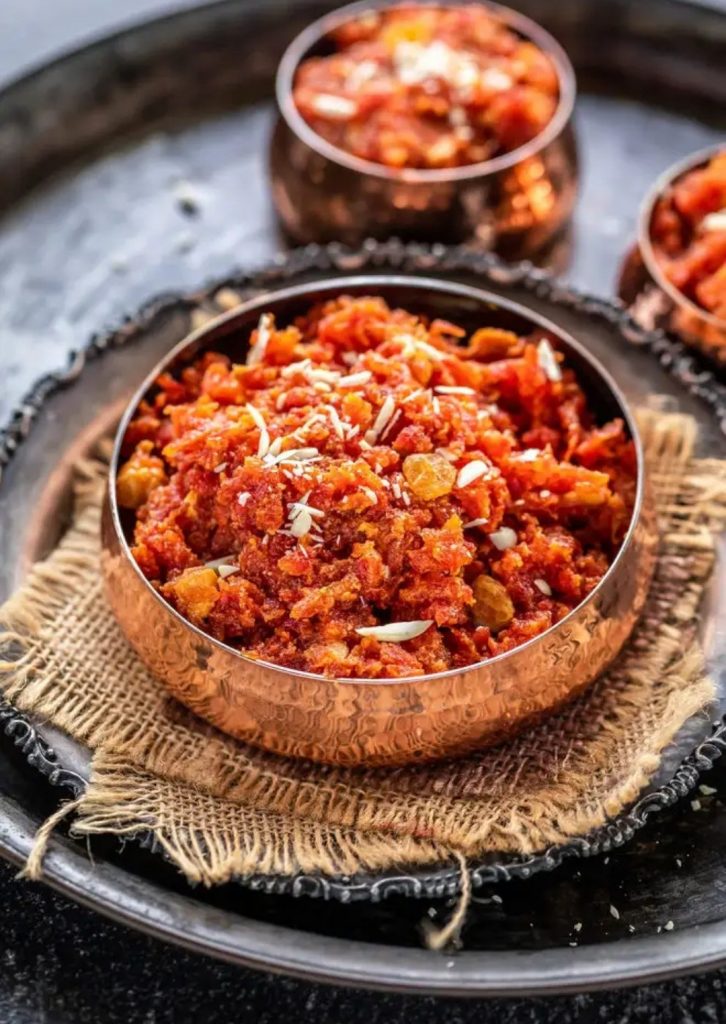
On a chilly winter evening, Punjab is the ideal location to have Gajar ka Halwa since it is a specialty of North India and Punjab is also the best destination to have Gajar ka Halwa.
Modern takes on traditional Mithais -Artisanal Mithai
An assortment of artisanal mithais and spiced nuts, handcrafted by Marriott’s master chefs and designed by India’s leading couturier Manish Malhotra. The range of signature mithai, included the revered Gulab Peda and Orange Blossom, a refreshing take on the traditional.
Figgy Almond- These delectable rolls are made to perfection with finest almonds and paired with cashews and locally sourced figs. Silver Cashew- A twist to our traditional barfi, this sweet is infused with silver leaves, saffron and cashew paste. Wheaty Barfi- is infused with sprout wheat flour and dried coconut. Gur Mewa- comes with the goodness of nuts slow-roasted in ghee, blended with cranberries and nutrient-rich jaggery. Rosette De Leche- made with naturally harvested aromatic roses, mixed with reduced milk with edible Gold.

The traditional mithais of India are an important part of India’s cultural heritage and are deeply intertwined with the country’s history, religion, and customs. They continue to be an integral part of India’s food culture, and many families have passed down their recipes and cooking techniques for generations.
Read More: Latest



